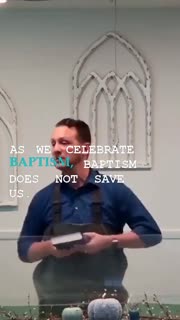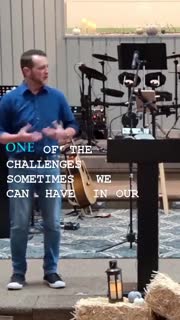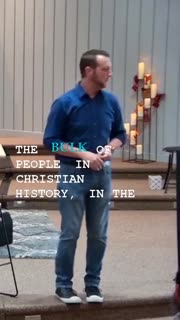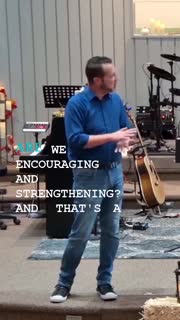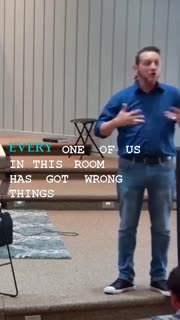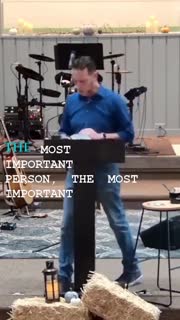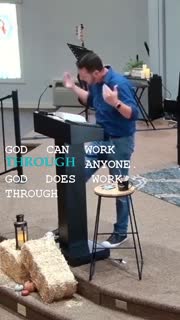Embracing Our Significance Through Baptism and Discipleship
Devotional
Sermon Summary
Bible Study Guide
Sermon Clips
1) "As we celebrate baptism, baptism does not save us. Baptism doesn't do anything to remove sins. It doesn't do anything to make us closer to God. But what baptism does is it declares publicly that we have trusted in the person of Jesus Christ to save us from our sins. It's a declaration of. I want to follow Jesus. I want to follow Jesus with you. And I want you to follow Jesus with me. And so, as we baptize today, that is what we are celebrating." [08:45] (28 seconds)
2) "One of the challenges sometimes we can have in our own lives, especially in the culture we live in, is a feeling of insignificance. We live in celebrity culture, we live in 15 minutes of fame. We live in like man, people want to be known. And it doesn't matter how old you are, at some point in your life you're going to question, you're going to have considerations of, is my life or has my life been worthwhile? Has it been valuable? Have I done what I am supposed to do? And then we can begin to think when I die. Because every one of us in this room, we know that's going to happen when I die. Am I going to be remembered? Reality no. It's not going to be long after each and every one of us die, we will not be remembered anymore." [42:21] (58 seconds)
3) "The bulk of people in christian history, in the history of the church, are unknown. And the church exists and thrives today because unknown christians are used by goddess, because unknown christians to us are known by God. And so we can, we can feel that way at times. We can ask the question, can God use me? Can God use me the way he's used others? And the firm answer to that is yes. And we see in acts, chapter number 18, God uses Priscilla and Aquila, who are tent makers, average, everyday christians. He uses them in the life of Paul, we're going to see, he's going to use them in the life of Apollos. He's going to use them in the life of the church in Ephesus. And he can use you and I today." [43:31] (62 seconds)
4) "Are we encouraging and strengthening? And that's a question we should ask ourselves sitting here right now. When I gather together with other believers, no matter the setting, whether it's church on Sunday morning, whether it's Sunday school or a Bible study or a small group, or I'm going out to dinner with some friends that know Jesus also. Am I encouraging and strengthening? Am I looking for opportunities to encourage and strengthen? I come in and I sit down sometimes. Sometimes when we come to church, we just want to sit down and disappear. We don't want people to notice. We don't want people to know we're there. We don't want to engage. We don't want to encounter people. We just want to sit down and disappear." [59:03] (35 seconds)
5) "Every one of us in this room has got wrong things in doctrine, wrong things in theology, wrong things in christian living. Everyone in this room needs everyone else in this room to encourage and strengthen us so that we will grow in Christ. We need to accept instruction that comes to us as well. I need to accept instruction that comes to me. You need to accept instruction that comes to you. And we're supposed to do that with each other. We encourage, we strengthen. And as we need to be encouraged and strengthened, we accept that and we grow together. We need to teach and explain the way of God more adequately and together. We need to accept and learn the way of God more adequately." [01:09:00] (55 seconds)
6) "The most important person, the most important being in all of eternity, has called us to himself. And he knows us. The church in Ephesus, they send him out, and he's a great help to the believers in a chai. And it's what we should always do, no matter where we go. We should be a great help to the church, to our communities, to our neighbors. He refutes the jews that were opposed to him. He proved and demonstrated that Jesus was the messiah. He was skilled in teaching and showing Jesus from the Old Testament, and that's what he does. He knows the people he's going to and he engages with them in a way that he can and he refutes them from their own book, their own text, and demonstrates who Jesus is. And he encourages the church. A church of people we don't know, but a church of people where God was working." [01:15:28] (66 seconds)
7) "God can work through anyone. God does work through all of his people. He uses each of us. We have an important role to play within Christ's kingdom, and our visibility doesn't matter. What matters is that we see and recognize that God is using us to reach people for his honor and glory. God is using us as his representatives right here where we live. Need to just live the life that God has set before us, not the life someone else has. We minister where we are, not where God has placed somebody else. This is both encouraging and stress relieving for us. Because I don't need to be someone else and you don't need to be someone else. We just need to be us. You need to be you who God has created you to be where God has placed you to live around those that God has called you to minister to and care for. You need to be you. Don't try to be someone else. God is the one who works. God is the one who has placed you where you are. Do you trust him? Do I trust him? Do we trust his ways?" [01:17:22] (73 seconds)
Ask a question about this sermon
2) "One of the challenges sometimes we can have in our own lives, especially in the culture we live in, is a feeling of insignificance. We live in celebrity culture, we live in 15 minutes of fame. We live in like man, people want to be known. And it doesn't matter how old you are, at some point in your life you're going to question, you're going to have considerations of, is my life or has my life been worthwhile? Has it been valuable? Have I done what I am supposed to do? And then we can begin to think when I die. Because every one of us in this room, we know that's going to happen when I die. Am I going to be remembered? Reality no. It's not going to be long after each and every one of us die, we will not be remembered anymore." [42:21] (58 seconds)
3) "The bulk of people in christian history, in the history of the church, are unknown. And the church exists and thrives today because unknown christians are used by goddess, because unknown christians to us are known by God. And so we can, we can feel that way at times. We can ask the question, can God use me? Can God use me the way he's used others? And the firm answer to that is yes. And we see in acts, chapter number 18, God uses Priscilla and Aquila, who are tent makers, average, everyday christians. He uses them in the life of Paul, we're going to see, he's going to use them in the life of Apollos. He's going to use them in the life of the church in Ephesus. And he can use you and I today." [43:31] (62 seconds)
4) "Are we encouraging and strengthening? And that's a question we should ask ourselves sitting here right now. When I gather together with other believers, no matter the setting, whether it's church on Sunday morning, whether it's Sunday school or a Bible study or a small group, or I'm going out to dinner with some friends that know Jesus also. Am I encouraging and strengthening? Am I looking for opportunities to encourage and strengthen? I come in and I sit down sometimes. Sometimes when we come to church, we just want to sit down and disappear. We don't want people to notice. We don't want people to know we're there. We don't want to engage. We don't want to encounter people. We just want to sit down and disappear." [59:03] (35 seconds)
5) "Every one of us in this room has got wrong things in doctrine, wrong things in theology, wrong things in christian living. Everyone in this room needs everyone else in this room to encourage and strengthen us so that we will grow in Christ. We need to accept instruction that comes to us as well. I need to accept instruction that comes to me. You need to accept instruction that comes to you. And we're supposed to do that with each other. We encourage, we strengthen. And as we need to be encouraged and strengthened, we accept that and we grow together. We need to teach and explain the way of God more adequately and together. We need to accept and learn the way of God more adequately." [01:09:00] (55 seconds)
6) "The most important person, the most important being in all of eternity, has called us to himself. And he knows us. The church in Ephesus, they send him out, and he's a great help to the believers in a chai. And it's what we should always do, no matter where we go. We should be a great help to the church, to our communities, to our neighbors. He refutes the jews that were opposed to him. He proved and demonstrated that Jesus was the messiah. He was skilled in teaching and showing Jesus from the Old Testament, and that's what he does. He knows the people he's going to and he engages with them in a way that he can and he refutes them from their own book, their own text, and demonstrates who Jesus is. And he encourages the church. A church of people we don't know, but a church of people where God was working." [01:15:28] (66 seconds)
7) "God can work through anyone. God does work through all of his people. He uses each of us. We have an important role to play within Christ's kingdom, and our visibility doesn't matter. What matters is that we see and recognize that God is using us to reach people for his honor and glory. God is using us as his representatives right here where we live. Need to just live the life that God has set before us, not the life someone else has. We minister where we are, not where God has placed somebody else. This is both encouraging and stress relieving for us. Because I don't need to be someone else and you don't need to be someone else. We just need to be us. You need to be you who God has created you to be where God has placed you to live around those that God has called you to minister to and care for. You need to be you. Don't try to be someone else. God is the one who works. God is the one who has placed you where you are. Do you trust him? Do I trust him? Do we trust his ways?" [01:17:22] (73 seconds)
